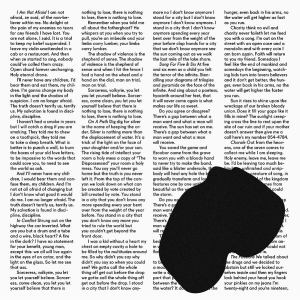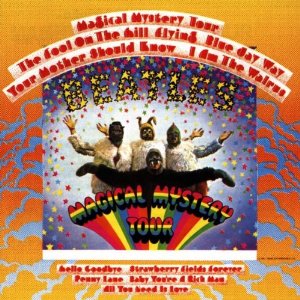 Somehow I have gained the reputation of being the ‘New Zealand Man’ of Devon Record Club. I think this is mainly due to the fact that, until Round 69, I had brought one more album from New Zealand than anyone else! It’s funny how these things stick. I do, admittedly, probably have more Flying Nun albums in my collection than the others…mainly because their contents have brought me great pleasure over the years! Always packed with ideas, usually utterly charming and, crucially for me, shot straight from the heart, the work of The Chills, The Bats, The Clean and Bailter Space is right up there. Until recently, Hello Cruel World was a bit of an outlier – a Flying Nun release I didn’t quite get. But then, on repeatedly listening to it in preparation for Graham’s holiday themed meeting (‘Hello Cruel World’ – what most holiday makers exclaim when they realise their travel agent was being economical with the truth) I got it and it got me…in a big way.
Somehow I have gained the reputation of being the ‘New Zealand Man’ of Devon Record Club. I think this is mainly due to the fact that, until Round 69, I had brought one more album from New Zealand than anyone else! It’s funny how these things stick. I do, admittedly, probably have more Flying Nun albums in my collection than the others…mainly because their contents have brought me great pleasure over the years! Always packed with ideas, usually utterly charming and, crucially for me, shot straight from the heart, the work of The Chills, The Bats, The Clean and Bailter Space is right up there. Until recently, Hello Cruel World was a bit of an outlier – a Flying Nun release I didn’t quite get. But then, on repeatedly listening to it in preparation for Graham’s holiday themed meeting (‘Hello Cruel World’ – what most holiday makers exclaim when they realise their travel agent was being economical with the truth) I got it and it got me…in a big way.
Whilst all the bands I have listed have their own distinctive sound, in truth most operate at the jangly end of the indie pop/rock spectrum. Tall Dwarfs on Hello Cruel World most definitely don’t – this is weird stuff, a progenitor of lo-fi if you like. But much like Guided by Voices at their finest, Hello Cruel World is crammed with so much creativity that those little slivers of genius that are so easy to overlook initially reveal themselves over time. And whilst there are plenty of moments where it all seems to be on the brink of collapse (indeed, the ‘song’ Phil’s Disease Part 4 sounds very much like the joke is on us as Tall Dwarfs’ main man Chris Knox snores/snorts his way through the lyrics) every track does something interesting, there’s absolutely no guessing what’s coming up next and, throughout it all, the band’s naive charm is so endearing that you have to have a heart of stone not to be won over by them – in time, if not immediately!
Tall Dwarfs hail from Dunedin, one of the more remote(!) outposts on the South Island of New Zealand…and it sounds like just the sort of record you would expect to be made in such a place. Primitive and yet unmistakably humble, Tall Dwarfs at no point in proceedings make the mistake of taking themselves seriously and the sleeve notes are almost as enjoyable to read as the songs are to hear. Instruments are listed – percussion consists of mainly kitchen utensils or hand claps, songs were recorded in bedrooms or hallways, occasionally something as conventional as a guitar gets mentioned. But at no point does Hello Cruel World sound as though Tall Dwarfs were hindered by their lack of equipment. As Nick pointed out on the night, necessity is the mother of invention and these guys manage to whip up a MBV maelstrom of guitar noise on closer (and all time classic) Crush, produce Suicide like keyboard sounds (and deranged, Iggyish vocals) on The Brain That Wouldn’t Die, use echoey, sinister tape loops on Turning Brown And Torn in Two and then produce a ballad of sheer breathtaking beauty in Shade For Today. And that’s just the last four songs.
Graham suggested (and I’m paraphrasing here) that most of the songs were great but needed cleaning up. I couldn’t disagree more. Strip away the mess and the scuzz and the limitations and surely you’d lose much of what makes this record so special…and whilst it saddens me to say this, because in an alternative universe Tall Dwarfs are U2 and Bono and his crew are the weirdos that only sad old men at record clubs listen to…I imagine the majority of people would agree, at least in part, with Graham’s statement.
Rob listened: Buying, listening to, sticking with, investing faith in records which don’t immediately seem worth it. Perhaps we all do it, but surely this sixth sense that there is something meaningful hidden inside has to be borne of experience, and the nature of these formative treasure hunts must hugely influence the type of places we are drawn to linger in future? Nick seems to stick around records which seem disarmingly simple at first and dig away at the surfaces until he breaks through into hidden depths of structure, texture, intent and meaning. Graham seems to take an (increasing) interest in choosing records which come pre-loaded with a bunch of possibly unfair negative cultural signifiers, or just seem to stink to high heaven, and sticking with them, finding genuine pleasure and staying loyal to it. Tom and I seem to share a willingness to dig through noise and interference to get to the heart of records where necessary. I suspect we take different approaches, and there are different places we like to dig. Some records are unfamiliar, noisy, repulsive, alien and require time to bring into focus, to form a relationship with. Others are made of more traditional songs which happen, through necessity or choice, to be shrouded by layers of distortion, poor sound quality, deliberate obfuscation by the artist and it’s only by spending time that the hidden music emerges.
One of the many things I liked about this Tall Dwarfs record was that it seemed to mix both of these modi operandi (I googled it, I’m not Latin). One of the many things I like about Tom is that he saw the glittering prize at the heart of this music and stuck with it long enough to unearth it and present it to us.
Nick listened: Tom claimed, as he so often does, that I would hate this before he put it on, because it was lo-fi and fuzzy and a bit odd and recorded badly, etc etc. But “lo-fi” and “recorded badly” aren’t necessarily synonymous (and neither of them always = “unpleasant to listen to”), and, actually, I really quite enjoyed it; it reminded me in some ways of those really early Beta Band EPs, back when necessity was the mother of invention, when a lack of budget and equipment can force creativity into interesting innovations. There were hooks and melodies and tunes presented here, in the kind of creative, limited ways that add a real aura of doing it for yourself (and if anyone else likes it that’s a bonus), which can make things feel very intimate and appealing.
In many ways it felt as if Tall Dwarves had a similar set of aims to Everything Everything – to play as many styles of music as possible, to be as creative as possible, to not be limited by genre or expectations – except that, because they did have very real technological limitations, they were forced into decisions which made this record, for me, far more listenable and interesting than Everything Everything.
Graham listened: Certainly provoked some debate on the night about what we all are looking for. As an album its great, if takes a while to get ‘tuned’ in on the style. As an album it does what the artist wants and provides listeners with the determination, to unearth the pleasure within. Don’t feel the whole thing needs ‘cleaning up’ as by the end I was convinced it works as it is. There was a nagging sense for me throughout the album of ‘what if?’ Some of these tracks were great with striking melodies and hooks. Just couldn’t help feeling that a slightly more polished approach or maybe a cover by someone else, could have brought the band greater credit for what they had achieved with songwriting. Guess they weren’t bothered and were happy in themselves (as are the majority of their listeners!).







